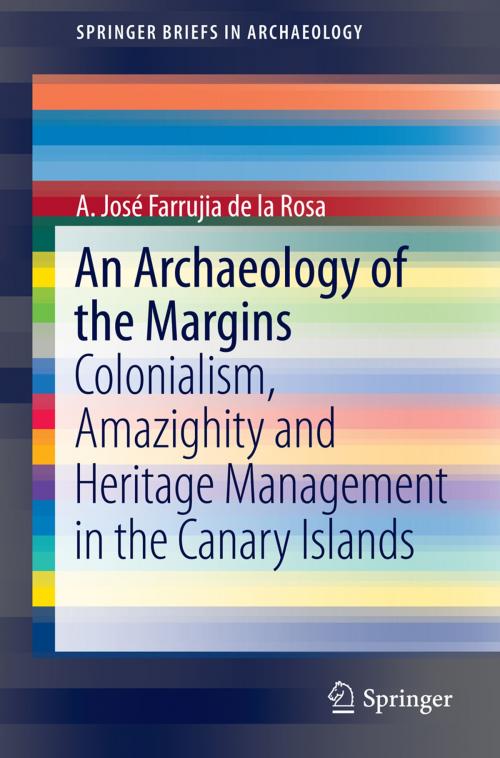An Archaeology of the Margins
Colonialism, Amazighity and Heritage Management in the Canary Islands
Nonfiction, Social & Cultural Studies, Social Science, Archaeology, Anthropology, History| Author: | A. José Farrujia de la Rosa | ISBN: | 9781461493969 |
| Publisher: | Springer New York | Publication: | November 26, 2013 |
| Imprint: | Springer | Language: | English |
| Author: | A. José Farrujia de la Rosa |
| ISBN: | 9781461493969 |
| Publisher: | Springer New York |
| Publication: | November 26, 2013 |
| Imprint: | Springer |
| Language: | English |
This book analyses the problematics of archaeological heritage management in the Canary Islands, which are echoed in other parts of the world where the indigenous heritage is under-represented. The present-day management of Canarian archaeological heritage has a very specific and unusual context given that the archipelago is located on the fringes of Europe, belonging to Spain and therefore to the European Unión, but geographically and in terms of early history being part of Africa. From a theoretical perspective, then, the proposed book analyzes issues such as the effects of colonialism and eurocentrism on the management of the archaeological heritage. It also examines the evolutionist and historico-cultural models used to analyze past societies and, ultimately, used to create identities that influence archaeological heritage management itself. From a practical point of view, the book presents a proposal for enhancing the archaeological heritage of the Canary Islands through the creation of archaeological parks (providing some concrete examples in the case of the city of La Laguna) and the active involvement of the local community. Parallel to this, the book considers the Canarian Archipelago as part of a problematic that is not unique to this area but is an example of poor indigenous heritage management overall. It demonstrates how the course of history and the politics of the past still have an excessive influence on the way in which the present-day archaeological heritage is interpreted and managed. Therefore, this book provides an almost unique opportunity for uncovering the history of archaeology within the margins of Europe (in fact, in an African region) and exploring colonial and foreign influences. In many ways it is a mirror of archaeological mainstreams and an exercise in (re)thinking the aim and status of present-day archaeology.
This book analyses the problematics of archaeological heritage management in the Canary Islands, which are echoed in other parts of the world where the indigenous heritage is under-represented. The present-day management of Canarian archaeological heritage has a very specific and unusual context given that the archipelago is located on the fringes of Europe, belonging to Spain and therefore to the European Unión, but geographically and in terms of early history being part of Africa. From a theoretical perspective, then, the proposed book analyzes issues such as the effects of colonialism and eurocentrism on the management of the archaeological heritage. It also examines the evolutionist and historico-cultural models used to analyze past societies and, ultimately, used to create identities that influence archaeological heritage management itself. From a practical point of view, the book presents a proposal for enhancing the archaeological heritage of the Canary Islands through the creation of archaeological parks (providing some concrete examples in the case of the city of La Laguna) and the active involvement of the local community. Parallel to this, the book considers the Canarian Archipelago as part of a problematic that is not unique to this area but is an example of poor indigenous heritage management overall. It demonstrates how the course of history and the politics of the past still have an excessive influence on the way in which the present-day archaeological heritage is interpreted and managed. Therefore, this book provides an almost unique opportunity for uncovering the history of archaeology within the margins of Europe (in fact, in an African region) and exploring colonial and foreign influences. In many ways it is a mirror of archaeological mainstreams and an exercise in (re)thinking the aim and status of present-day archaeology.















